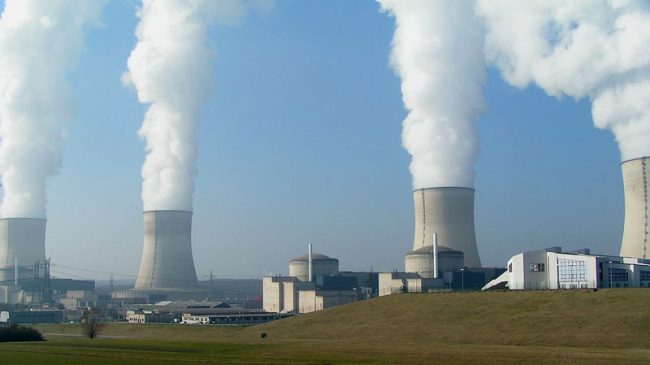Nuclear energy is receiving renewed attention this election season, thanks to the battle-cry of energy independence that both presidential candidates have raised. Our contributors to this edition of the Reason Roundtable consider whether nuclear energy is the right answer – but let me begin by pointing out why energy independence is the wrong cause.
Every president since Richard Nixon has muttered direly about the need to make America “energy independent.” But this old and tired saw has assumed new importance now because both Barack Obama and John McCain are offering it as the weapon of choice to vanquish all the alleged threats we currently confront – terrorism, recession and, not to forget, global warming.
In the last debate, both candidates pledged to end America’s reliance on Middle Eastern and Venezuelan oil within 10 years (Canadian oil supposedly is OK) – a nonsensical goal since oil is a fungible commodity with a single global market. Both candidates also claim that replacing oil with alternative fuels will create “millions of jobs” and, once again, put America on the road to riches. “We can’t keep on borrowing from the Chinese and sending money to Saudi Arabia (to pay for oil),” Sen. Obama thunders on the stump (a formulation more admirable for its pithy syntax than grasp of economics.)
But the fact of the matter is that energy independence is neither feasible nor desirable. Indeed, when Nixon originally took up this crusade in the wake of the oil embargo, America imported a third of its oil. Now it imports 60 percent. Why? Because imported oil is cheaper than indigenous oil. Trying to fight this reality won’t create jobs or restore America’s economy, it’ll do the opposite.
Third World countries in Latin America and Asia learned this lesson the hard way when, in their zeal for economic self-sufficiency, they embraced a something called the import-substitution approach half a century ago. The idea was to discourage imports of key industrial products such as factory equipment and machinery through trade barriers and encourage their domestic production through massive subsidies. The upshot, however, was neither self-sufficiency nor prosperity. Rather, import-substitution raised production costs, making Third World goods uncompetitive in the global markets and prohibitively expensive at home, consigning these countries to decades and decades of economic stagnation that has not yet been fully reversed. Delinking America from global energy markets will wreak similar economic havoc.
But will energy independence make America more secure by depriving terrorist nations of petro dollars? Not really. Indeed, insofar as America, the single biggest oil consumer, spurns Middle Eastern oil, it will only make it that much cheaper – and therefore more attractive than the alternatives – for everyone else, including India, China and other energy-hungry emerging markets. The result might well be a new geo-political alignment with countries dependent on Middle Eastern oil in one camp – and “energy-independent” America in the other. This is not a recipe for defunding terrorism. Rather, it is a way of giving Middle Eastern countries even less of a stake in our well being and making them less interested in helping our struggle against terrorism.
Energy independence therefore offers no rationale for building 45 new reactors in America by 2030 as John McCain wants. That, however, doesn’t mean that there is no case for nuclear power – or, for that matter, other alternatives to oil. Oil prices are inherently volatile, making it hard for businesses and manufacturers to reliably plan ahead. What’s more, a diversified fuel supply that is not too dependent on any one source would increase economic security. And to the extent that such fuels supplement existing oil supplies, they would bring down overall energy costs and boost economic growth.
In an economy unencumbered by barriers to entry or distorted by other government policies, the market of course would be constantly searching for the most viable alternatives. But that is far from the case in America where a complicated web of government subsidies, taxes and trade barriers has severely crimped some fuels while artificially boosting others. So the question before the current Reason Roundtable is whether nuclear energy would be economically viable if it were neither helped nor hindered by government policies. Can the industry offer energy consumers sufficient value to stand on its own without shaking down taxpayers or receiving immunity from liability for future hazards?
Nuclear, to be sure, has many advantages over other alternatives currently on the table: It is plentiful, clean, and, in the long run, cheaper than other fuel sources. What’s more, unlike wind and solar, it is capable of generating a steady supply of energy without disruptions due to the weather. Yet nuclear’s share of the American energy market has effectively remained stagnant at about 19% for the last many decades. France, by contrast, gets about 80% of its energy from nuclear.
Is this because of an overly cumbersome regulatory process and political opposition to nuclear plants? Or are potential investors daunted by the prospect of nuclear’s heavy upfront capital costs?
William Tucker, an award-winning journalist and author of, Terrestrial Energy: How Nuclear Power Will Lead the Green Revolution and End America’s Long Energy Odyssey, believes that nuclear’s challenges in America are not economic – they are political. Existing nuclear power plants are raking in $1 million a day, he points out, something that has, ironically enough, triggered calls for a windfall profit tax on these plants. Yet few new nuclear plants are being built in America right now. “Both Wall Street and the utilities fear that, as soon as the first proposal comes out of the box, environmental and opposition groups will gang-tackle it, exploiting the public’s fear about safety and nuclear ‘waste,'” he explains.
Jerry Taylor, a senior fellow at the CATO Institute, however, disagrees. He points out that the high upfront cost of building safe and reliable plants have raised both the opportunity and risk costs of nuclear, making it unattractive for potential investors. Only in countries where government has stepped in has nuclear flourished. “Those who favor nuclear power should adopt a policy of tough love,” he counsels. “Getting this industry off the government dole would finally force it to innovate or die – at least in the United States.”

